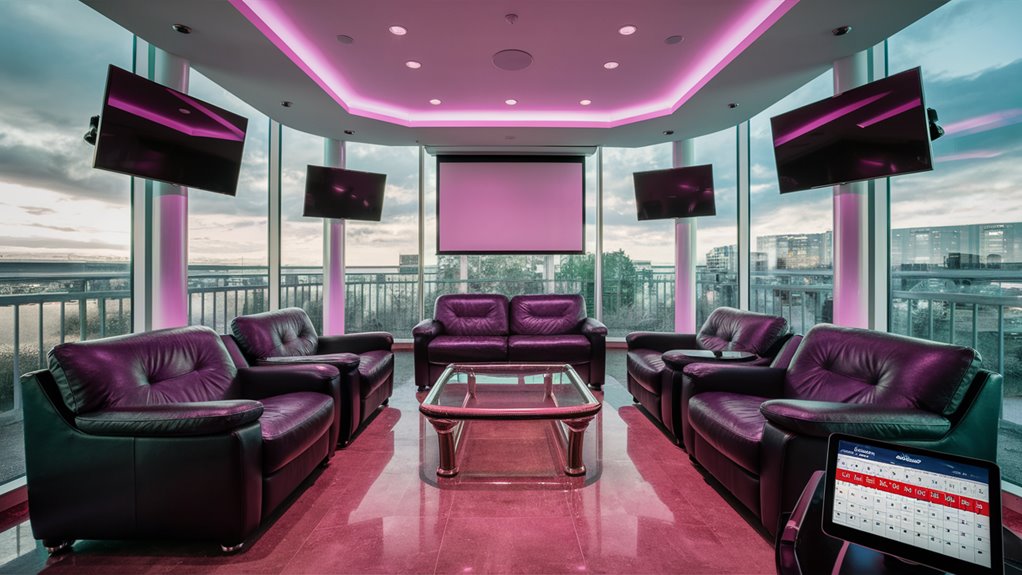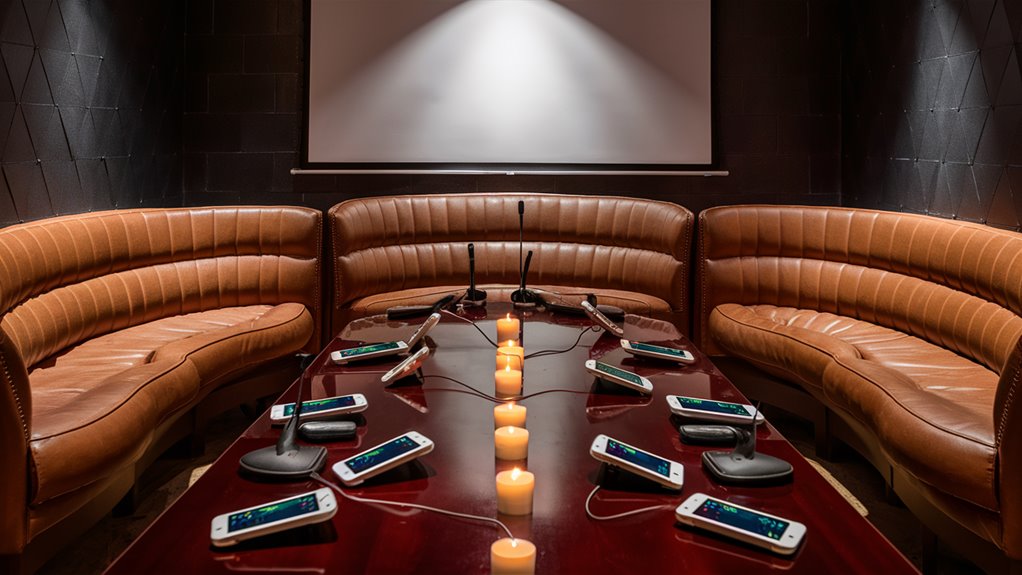How to Book Karaoke Ahead for Big Groups

Plan Your Group Karaoke Party
Plan early when booking karaoke for big groups, start 3-4 weeks early. Know how many will come and add 10-15% more for last-minute joiners. This makes sure you get a big-enough room.
Room Sizes and Fits
Karaoke rooms come in three sizes:
- Small rooms: Holds 6-8 folks
- Medium rooms: Holds 10-12 folks
- Large rooms: Holds 15-20 folks
Costs and Booking Steps
Hourly costs of rooms are $25-80, depending on place and size. Many spots have deals for 8+ groups, possibly with:
- More sing time
- Food and drinks
- A server for your group
- Early song picks
Get the Room
To reserve your room:
- Make a 20-50% payment first
- Get a written yes
- Know how to cancel if needed
- Check set-up time
- See how songs are picked
- Ask about breaks
Other Points to Check
Check places having:
- Good sound systems
- New songs
- Stuff for groups
- Booking times
- Extra party stuff
How Big Your Karaoke Group Is
Count Coming Friends
Right planning on group size makes a fun karaoke party. Know who’s coming 7 days before booking. Many karaoke spots want your count for their rooms. Use online ways or chat groups to track yes-sayers.
Guide on Room Size
Typical room sizes hold:
- Small rooms: 6-8 folks
- Medium rooms: 10-12 folks
- Large rooms: 15-20 folks
- Party rooms: 25+ folks
Add 10-15% more space for last-minute guests. This smart plan ensures enough room without wasting space or money.
Think About Space
When you set final numbers, think of:
- Extra guests
- How many pals can invite pals
- Space for dancing
- Area for food and drinks
- Enough seats
Choosing right room size impacts comfort and mood. Too small makes it tight, too big may feel less fun and cost more.
Choosing the Best Karaoke Spot
Group Size and Room Choice
What it holds is key in picking a karaoke spot. Private karaoke rooms vary a lot, from small ones for a few pals to big party rooms for many. Look for places fitting your needs, see how rooms are set and their rules.
Needs for Good Sound and Stuff
Good sound systems and new stuff are key for great karaoke. Must-haves are:
- Top sound systems
- A few good mics
- New songs all can enjoy
- Nice screens
- User-friendly controls
What the Spot Offers
Costs and what comes with them vary by place. Think big on:
- Minimum spends on food and drink
- Room time and costs
- What food they serve
- Special group deals
- How much down to book
Getting There and Safety
Easy to reach spots matter a lot. Think on:
- A central spot for all
- Enough parking
- Near buses or trains
- Good safety steps
- Open when you need
Balance these with what others say and how well it rates to pick a place that ensures a top experience for your pals.
Private Room vs Open Space Karaoke: Which to Choose
Life in a Private Room
Private karaoke rooms offer your own area to have fun. Your own singing spot lets your group have its own sound, picking songs alone. Great for lovers of the limelight or the shy ones.
Why Private Rooms Rock
Just for your group options often include:
- Your own help person
- Your screens for songs
- Sound just for you
- Lights to change as you want
- A sure go at the mic
Feel of Open Spaces
Public karaoke areas make fun spots where chatting up new folks happens. These places for all suit those liking a crowd. The vibes here can lift the night.
How to Pick
Think on these main points when choosing:
- Your group’s size and makeup
- Your budget and minimum spend
- If you want a private spot or a more open feel
- If they can book your desired time
- If your pals like meeting new ones
For mixed groups, private rooms are best for fun and comfort. While open places are cheaper and more spontaneous, private rooms ensure all can join the fun as they wish.
What Karaoke Costs and What You Gain

Understanding What’s Included
Private and open places have different prices for groups of all sizes. The trick is choosing a deal that offers the most for your needs 호치민 술집
Standard Cost Setup
Usual per hour costs for rooms start at $25-40, but top deals are $50-80 each for 3-4 hours. Off-peak deals cut costs by 20-30%, making weekday afternoons and early evenings good for budget-conscious groups.
Packages That Add Value
All-in-one deals often work best, especially for groups of 8 or more. These usually include:
- Snack platters
- Drink vouchers
- Early song picks
- Extended sing times
- Services and Responsibilities
Booking What You Need and Rules
Payments and Other Costs
- Booking deposits: 20-50% of total cost
- Set spends on food and drinks might be needed
- Tip expectations vary by spot
- Late cancellation fees
Tips to Save Money
- Compare per-person rates across offers
- Choose off-peak times
- Use group discounts
- Bundle extras and services
How to Book a Karaoke Room
Key Booking Steps
Plan well to ensure you get what you want. Call the place during business hours to speak to their event coordinator or the one handling bookings. Have these details ready:
- Date and duration of your visit
- Number of guests
- Any special needs
Important Details to Check
Discuss these important points when booking:
- If they have space and when
- Minimum spends needed
- Deposit details
- How to cancel if needed
- Hours they’re open and any timing rules
- How their song system works
- What sound equipment they have
Make Sure the Room Is Yours
Getting a written confirmation means your room is securely yours. Double-check your booking includes:
- All details (date, time, room size)
- Cost details
- Any special arrangements
- Contact numbers for booking
- How you paid
Best Time to Book
For busy times like:
- Weekends
- Holidays
- Big events
Book 3-4 weeks early to ensure they have space. Prime times might need even earlier booking. Fill in their booking form and pay your deposit however they accept:
- Credit card
- Bank transfer
- Other ways they accept
When Everyone Should Arrive
Plan Arrival Time
Good karaoke plans need right timing, clear communication, and back-up plans. Get these right for a smooth party that’s fun for all.
Manage Arrival Time
Set a 30-minute window before you start. This gives time for latecomers while you set up and mingle before the singing starts. Let everyone know about the location and parking with a group message 48 hours before.
Plan Online
Set up a shared online event with reminders:
- A week before
- A day before
- Three hours before it starts
Include contact info for a main person in the invite, so they handle venue communication and direct guests.
Handling Changes
Have a solid plan B by:
- Picking someone to track RSVPs
- Keeping a group chat active
- Having direct communication with the venue
- Watching who can still come
If People Are Late
Start with a set list of first songs by on-time folks. This plan keeps the fun rolling as others join. Set up a song picking method that works no matter when folks arrive.
How to Choose Karaoke Songs
Create a Fair Song List
Managing who sings when is key to a great karaoke night. Set up singing rules early so it runs smooth. Have a set order where each singer or group has a turn before it cycles back.
Song Time Rules and Turns
Limit songs to 4-5 minutes to let more sing. Be clear if singing with another counts as one or two turns. No repeats of the same song in one night to keep it fresh.
Prep Before the Event
Plan Your Songs
Create a song list that suits your event and who’s coming. Start a number system to pick songs ahead, making it easy to know who’s up next. Have other song options ready and a plan for tech hiccups.
Keeping It Smooth
- Track who sings when
- Stick to time rules
- Decide pairing rules
- Check if lyrics are suitable
- Be ready for issues
Build a solid song choice plan that keeps everyone excited and the party moving right. Set ways to adjust last minute while keeping a fair order for all singers.


